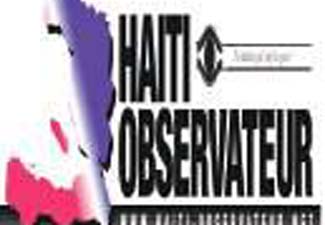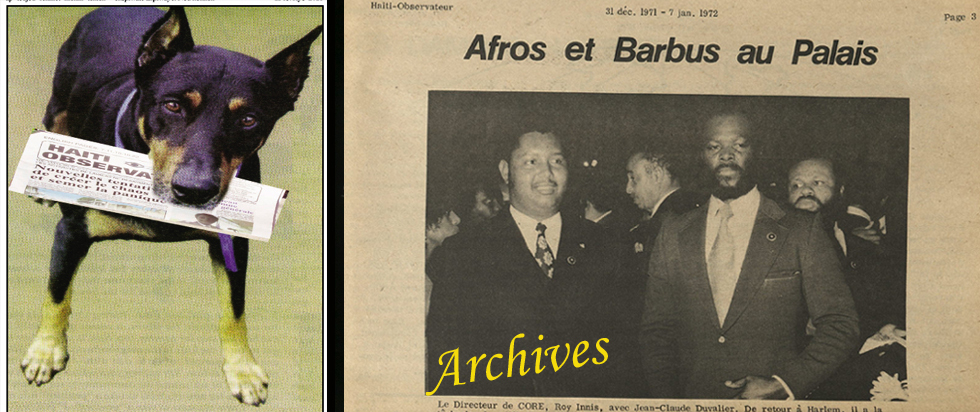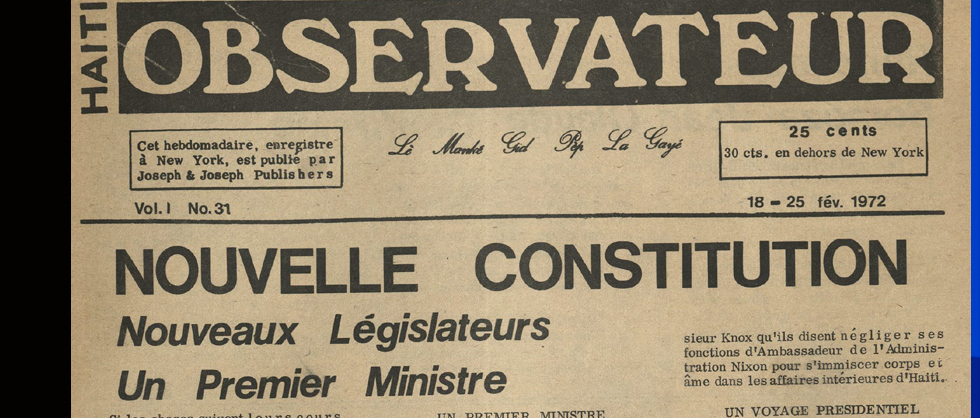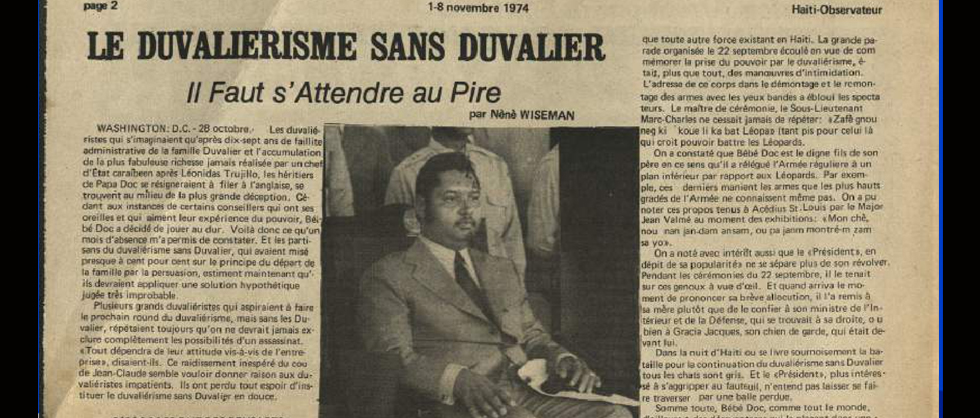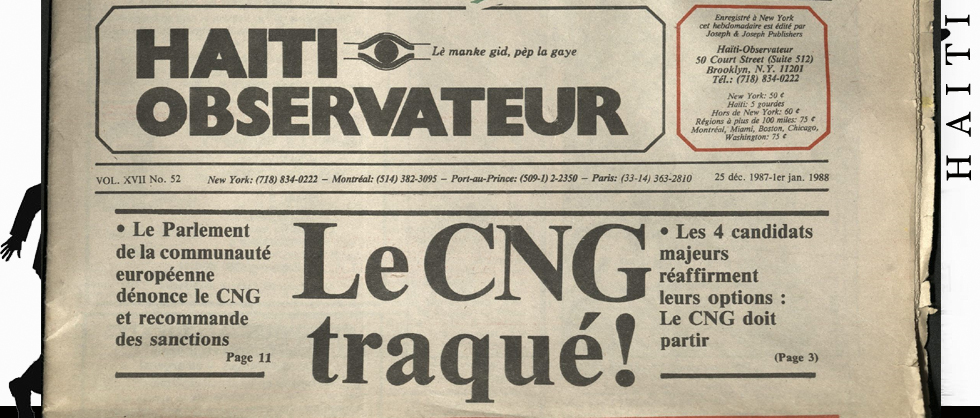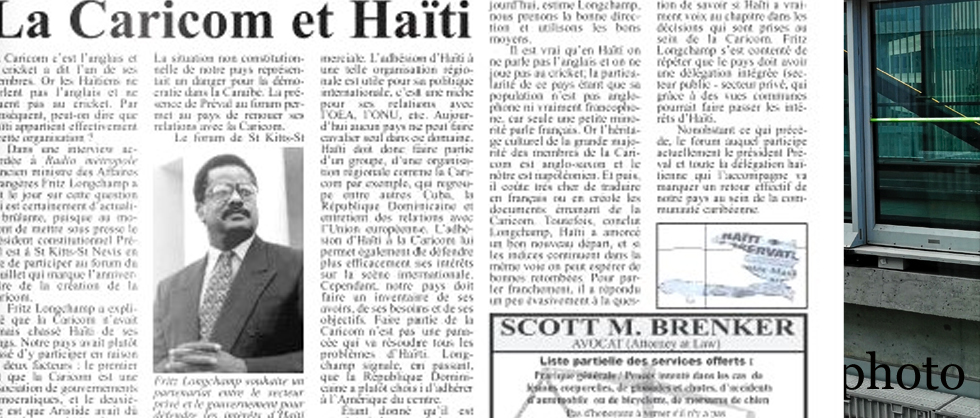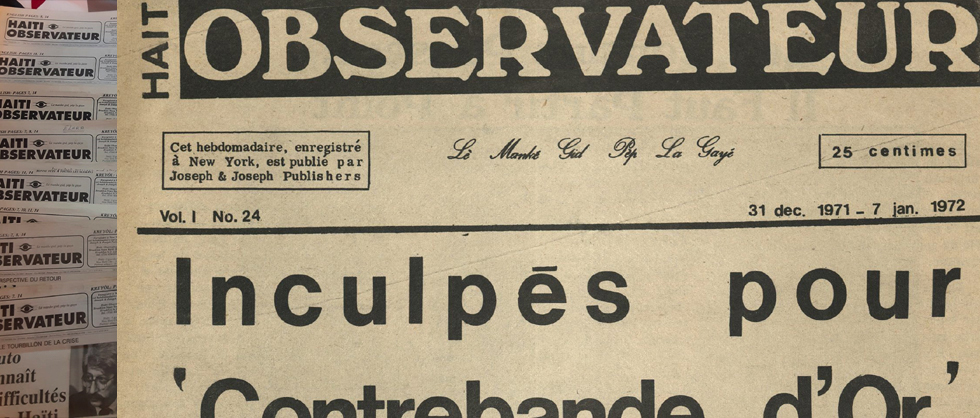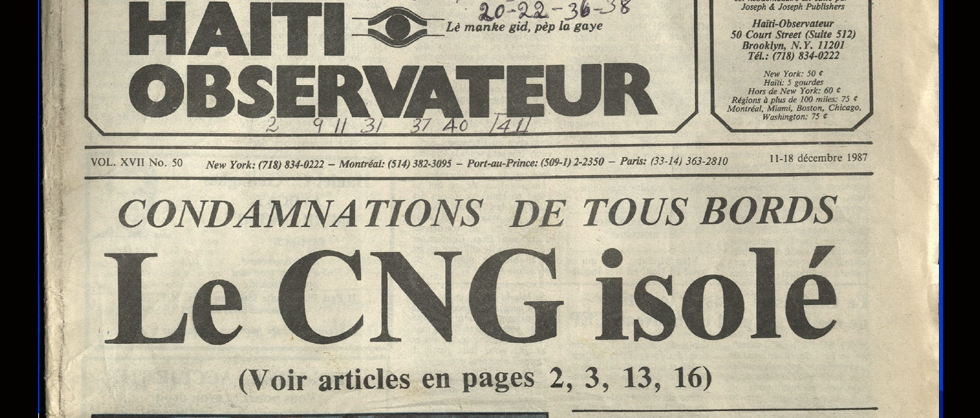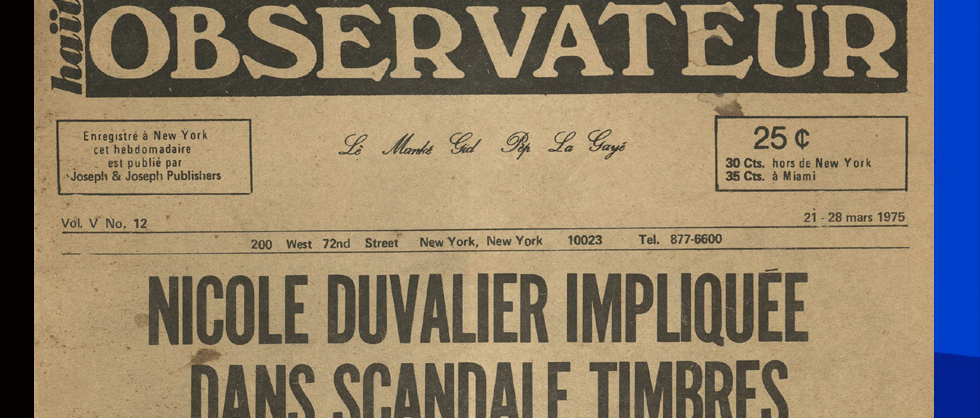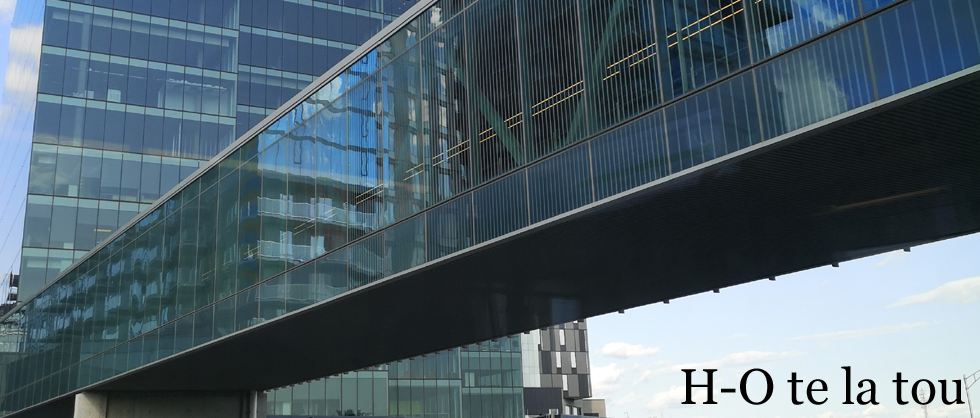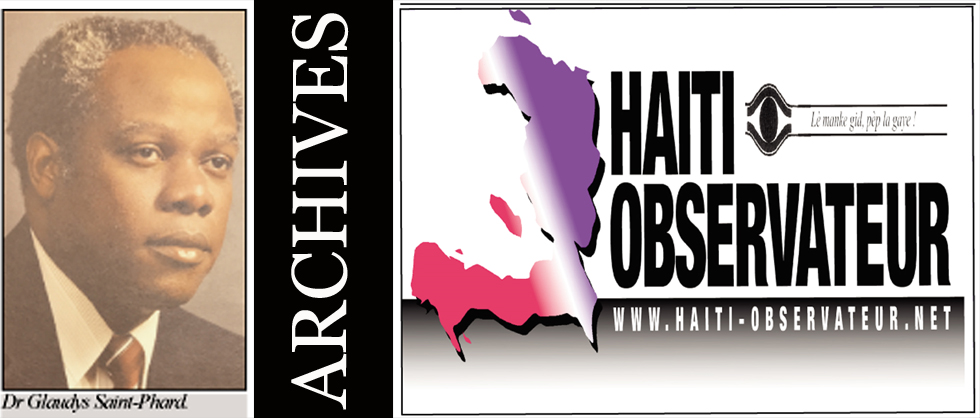HAPPENINGS
- Turmoil in Haiti made worse by U.S. and Haitian officials by RAJ
In the midst of turmoil in Haiti since February 7, the country was jolted by the arrest, February 17, of eight heavily armed men, including five American citizens, two aliens holding U.S. permanent residence and one Haitian citizen, a deportee from the U.S. in a drug-related case. Three days later, on February 20, the situation was exacerbated by the release and flight to Miami of the Americans and the alien U.S. residents, dubbed “mercenary terrorists” by most Haitians. As reported in our last issue, the men in two vehicles without plates were stopped by a patrol of the Haitian National Police (French acronym PNH) late that Sunday afternoon near Haiti’s central bank, Banque de la République d’Haïti, referred to as BRH. On seeing the arsenal in the vehicles, the patrol leader called for backup, which arrived in minutes. A third vehicle arrived at the scene with a French-speaking civilian at the wheel, whose identity was not revealed. He was also put under arrest. The party was taken to the downtown Port-au-Prince Police precinct where the commandant conducted the interrogation. The men were Mum about their mission, except for the one who appeared to be the leader of the group who said they were “on government mission,” adding, “my boss will call your boss.”
Consider the following: The unnamed individual in the third vehicle attempted to dissuade the police from jailing the men. One of the vehicles stopped by the police was registered in the name of Jean Fritz Jean-Louis, a former Cabinet minister, who had pressured the police to release the men. In addition, Zéphyrin Ardouin, another former Cabinet minister close to President Jovenel Moïse, had called the police to obtain the release of the men. Finally, Justice Minister Jean Roody Aly joined the chorus in demanding their release. All to no avail. Clearly, the “boss” mentioned by the apparent leader of the “mercenary terrorists” is the Chief Executive, via his subordinates.
That will be confirmed later by one of the arrested –and released—individuals in an extensive Instagram post. In that post, Ex-Navy SEAL Christopher Michael Osman, who goes by his nickname Chris, appears to be speaking for the men who apparently were under his command. He offers some answers, though not all, to questions that have been asked about the presence of those men in Haiti, especially at a time when mammoth demonstrations have gone on for days around the country, with people calling for the resignation of President Moïse. We quote Chris Osman :
“Sometimes life is stranger than fiction and filled with crazy adventures. I am alive and back home. We all are. It’s now known that I do security work and have done it for years. My days of doing any out of the U.S. is officially over because I’m plastered all over media around the world.
“The team was in Haiti to provide security work for people who are directly connected to the current president. We were being used as pawns in a public fight between him and the current Prime Minister of Haiti.
“The people of Haiti were really good to us and all of us will forever be thankful to the ones in the jail who helped us. The jails are awful with conditions I wouldn’t wish for anyone to experience.
“We were not released, we were, in fact, rescued. To the men who risked their lives to do so, you boys are getting some serious care packages!!! We owe you our lives.
“Thank you to the American government, the State Department, the U.S. Embassy in Haiti, the American Ambassador to Haiti, and the hundreds of men and women (sic) who stepped in to save us. It’s been a long time since I have seen the weight of the U.S. government at work and it’s a glorious thing.
“Thank you to the hundreds of people, family, and friends who reached out to my wife to help her during this difficult time. To my ‘H8ti’ Brothers, thank you for never wavering.” Must we believe that “H8ti” was the operation code name ?
Here are the other members of the team : Chris Osman’s fellow Navy SEAL Christopher Mark McKinley, Ex-Marine Kent Leland Kroeker and two other Americans: Talon Ray Burton and Dustin Daniel Porte. Initially, mention was made of a Russian citizen among the team, but only two Serbians are confirmed : Vlade Jankovic and Danilo Bajagic, and the Haitian Michael Estera, who remains in jail because he has no powerful American government in his corner.
Analyzing Chris Osman’s statement, one cannot dismiss a declaration made by Prime Minister Jean Henry Céant on Monday, February 18, to CNN, in which he said that among the “mission” of the men was his assassination. In a way, Osman confirms it. “The team was in Haiti,” he writes, “‘to provide security work for people who are directly connected with the current president.” Moreover, he adds: “We were being used as pawns in a public fight between him (the President, that is) and the current Prime Minister of Haiti.”
To provide that “security” the men had at their disposal some powerful tools and weapons. As published last week, we are updating the information. Mind you, six automatic rifles, six pistols with silencers, two professional drones, three satellite phones, a telescope, backpacks full of munitions, gun vests, four Haitian car plates and many documents with names of certain politicians and journalists. No doubt, those people who are considered opponents, even enemies, of the President, were targeted for execution. However, Chris Osman cannot say that. They are not assassins, just “security providers.” If in the process of providing security some people are killed, that should be considered collateral damage.
Therefore, the Police patrol that spotted them did them a service. Better armed than the police officers, the Osman Team could have wiped them out in the twinkling of an eye. However, that would have turned into a major negative story internationally. They are professionals who carry out their duty at a distance, wherefore their telescopic rifles. Alternatively, in close proximity but silently, wherefore their revolvers with silencers.
Being caught flagrantly with an impressive war arsenal, and having arrived clandestinely in Haiti, for there is no stamping in their passports as to their day of arrival, these men were spared a day in court in Haiti. Oh, they would face justice in their country !
However, as has been reported by the Miami Herald, U.S, officials say they have no charges against them. Thus, all have gone home free, and Chris Osman, speaking for his colleagues, thanks the personnel of the American Embassy in Haiti, especially the Ambassador, for what they have done for them. He is overwhelmed as he muses on American power. “It’s been a long time since I have seen the weight of the U.S. government at work, and it’s a glorious thing,” he says. However, they broke Haitian law, by entering clandestinely in the country, by moving about with vehicles without plates and having a mobile war arsenal, they are absolved of wrongdoing. In addition, Michele Sison, the American ambassador, in an interview with Jean Robert Phillippe, of the Voice of America, states that the release of the men and their hasty departure from Haiti was “coordinated with the Haitian authorities.”
The fallout in Haiti of the hasty departure of the “mercenary terrorists”
The Prime Minister’s spokesman, Pascal Adrien, said Jean Henry Céant knew nothing about the departure of the seven men, including five Americans. Astonishingly, the Palace also said the president did not know that the men were leaving the country. So, who approved their release and departure ?
In a note, dated February 20, Justice Minister Jean Roody Aly was cagy in how he asked Joany Canéus, director of the Central Direction of the Judicial Police (DCPJ) –that is the jail—, to release the men: “. . . I am informing you that a procedure was authorized to transfer to the United States of America the American citizens and the permanent residents, seven in total, to stand trial for illegally transporting firearms from the United States to Haitian territory.” In addition, the names, already mentioned above, followed, with their dates of birth and sex. Who really “authorized the procedure ?” A mystery! For sure, the American ambassador was part of it. In addition, who else besides Minister Aly ?
That same afternoon the men arrived at the Port-au-Prince international airport accompanied by two employees of the American Embassy. They were treated as VIPs, waiting in the Diplomatic Salon until they boarded the American Airlines flight, sometime after 4:30 pm, bound for Miami. Of course, there is no “standing for trial” in any U.S. Court because, apparently, they did not leave the U.S. with the arms. Were the arms waiting for them in Haiti? How did they get there ? It is said that they arrived in Haiti from Jamaica in a special plane that landed clandestinely somewhere in Haiti, possibly in Les Cayes, the main city in Haiti’s south-western peninsula. Obviously, the men must have been welcomed by “those people directly connected to the President” for whom they were going to work. It does not take rocket science to figure that out.
The Superior Council of the Judicial Police (French acronym CSPJ), headed by René Sylvestre, the Chief Justice of Haiti’s Supreme Court, dispatched a letter on February 21 to the Justice Minister, denouncing “the illegal and arbitrary act” of letting go of the alleged “mercenary terrorists.” Expressing “aw and bitterness,” the Council asks for an explanation of what happened.
Interestingly, the Chief Justice was named at his post on February 1st , in an anti-constitutional move by President Moïse, probably to protect himself from the fallout of the PetroCaribe report of the Government’s Auditors (La Cour supérieure des comptes et du Contentieux administratif) which showed that two companies of the former businessman (Agritrans & Copenher) had participated in the PetroCaribe scandal.
Meanwhile, that same February 21, Prime Minister Céant also weighed in. He wrote to Minister Aly, emphasizing “grave prejudice to national security” with all the illegal weapons of war found in possession of the eight men and for seven of them leaving the country. As chair of the Police Board, called Superior Council of the National Police (French acronym (CSPN), Mr. Céant asks the Minister to “speedily [prepare] a detailed report [for him] about all the steps taken and all the administrative documents, with the legal references, which allowed you to take such a decision.”
 In a move to derail any investigation into illegal stockings of heavy weapons and his organizing stealthily a paramilitary force with foreign expertise, President Moïse, without cabinet participation, boldly issued a decree on February 21. In it are named seven individuals for the most part unknown to an “Inter-Haitian Dialogue Commission,” thereby scraping a similar commission entrusted to the Prime Minister late last year, after the countrywide demonstrations last November 18.
In a move to derail any investigation into illegal stockings of heavy weapons and his organizing stealthily a paramilitary force with foreign expertise, President Moïse, without cabinet participation, boldly issued a decree on February 21. In it are named seven individuals for the most part unknown to an “Inter-Haitian Dialogue Commission,” thereby scraping a similar commission entrusted to the Prime Minister late last year, after the countrywide demonstrations last November 18.
Then on Friday, February 22, the General Secretariat of the Palace issued a communique, stating that the new commission “has fifteen days to work, respecting the Constitution, to undertake a political dialogue in frankness and sincerity, leading to putting in place of an inclusive government capable of responding to the aspirations of the population.” A maneuver to get rid of the Prime Minister, who has refused to resign !
On Sunday, February 24, 24 hours before the President was to install the new commission, Charles Suffrard, the most prominent among the designated commission members, wrote to the President to decline participation in the commission. With the lesser-known economist Carlo Joseph, who has contested as a representative of the Petro Challengers, on Monday (February 25), the President installed his 5-member commission. Other than Suffrard who officially had declined participation, a certain Dérose Rudolf did not show up for the Monday ceremony.
President Moïse paid no attention to the advice of Gary Bodeau, president of the Lower House of Parliament, who attempted to dissuade him from going ahead with officializing his new commission. In a letter made public Monday morning, Deputy (Congressman) Bodeau, wrote, “Considering the crisis situation which can’t be solved except in a large national consensus, the president of the House of Deputies would suggest that you take a few days to reflect more profoundly and get better contacts to complete this structure that should be more balanced, and able to generate patriotic understanding concerning the Haitian drama.”
Generally, it is believed that the new presidential commission is dead on arrival. This business of turning to commissions whenever the citizen stake to the streets to rail at the government will not do the job. Last January 22nd, the initial meeting to get all national sectors around the table was a flop. Publicly, President said he was not “satisfied” with the Prime Minister who failed to get key players, including members of the PHTK ruling party, to attend the meeting. Nevertheless, the President soldiered on, expecting that last February 7 all sectors would have finally come together. Instead of a solemn meeting on that day, it was the general uprising throughout Haiti threatening Jovenel Moïse’s presidency. In the end, even the “mercenary terrorists,” 43 according to the latest report, have proven inadequate. RAJ February 27, 2019.
cet article est publié par l’hebdomadaire Haïti-Observateur, édition, du 27 février 2019 et se trouve en P. 1, 3 à : http://haiti-observateur.info/wp-content/uploads/2019/02/H-O-27-fev-2019.pdf
